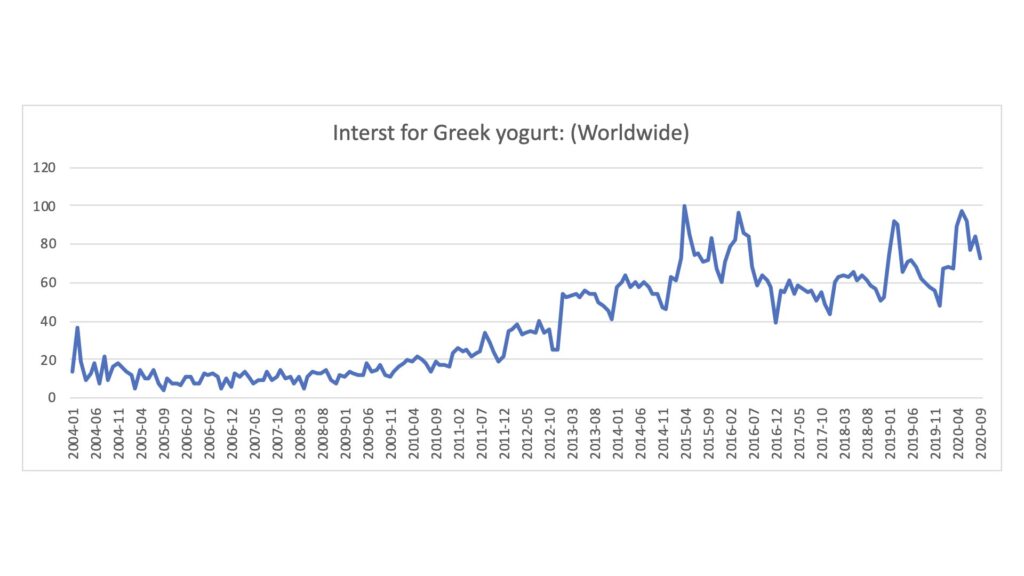It has been an absolute crazy week at work. I sat down after my Saturday lunch and began writing this week’s curiosity box. All questions that piqued by curiosity this week are centered around the kitchen.
1 – In Greece, do they still call it Greek yogurt?
My colleague had an absolute startler in the middle of the week when I asked him, “Hey, do people in Greece call it yoghurt as opposed to Greek yoghurt?“ This genuine serendipitous question turned out to give surprising answers. Apparently, Greek yoghurt is not from Greece at all!
In Greece, they call it as straggisto (or strangisto) which translates to drained or strained. And that is the nature of the yoghurt as most of the whey is taken out of it to give its distinctive thicker consistency while maintaining the sour taste of yoghurt. Because there is no “one way” to make this type of yoghurt, the exact origins of this yoghurt are supposed to be from around the middle east, but the specifics are unclear.
The term “Greek Yogurt” is ingrained in our minds because of marketing. Fage (pronounced as fa – ye), a company from Greece, first introduced this new type of yoghurt in the US market. And when they did so, people just called it Greek yoghurt because the company was from Greece. As other companies started selling the same, Fage fought it out in the court to make sure theirs is the only company that can sell Greek Yogurt. The other companies simply adapted their brand name and began selling their products as Greek-style yoghurt.
The need for such extremes is because of market demand. In the US alone it is estimated that the Greek yoghurt market will be worth $12.3 bn by 2024. 2008 seem to mark the shift in trends and demand as well for this yoghurt.

The fitness community (which I am guilty of as well) have been one of the main drivers for the demand of this food. Although it has more protein and fat, and lesser carbs, some nutritionist don’t recommend the the Greek yoghurt. Long story short, the truth lies in moderation, and that debate is for another day.
2 – Why does drinking beer make you feel colder?
Many believe that having a peg of whiskey or brandy helps warm you up. If you grew up watching movies like me, you must have noticed actors suggesting to have some drink to fight the cold. If you know the mechanism in which our body works, this is precisely the opposite thing you must do.
Alcohol reverses some of the normal functions of the human body. It is by nature as a vasodilator, which means drinking alcohol results in your blood vessels becoming wider. Additionally, alcohol increases the release of adrenaline which increases the heart rate. Now with a higher heart rate and a wider blood vessel, you have more blood flowing right up to the surface of the skin, leaving not a lot of blood at the core. Although this rush of blood warms you up, the feeling is only temporary. And this is where people get things confused with their belief system.
One more normal function that alcohol reverses is our ability to shiver. Shivering is our natural body reaction to warm the muscles up if it gets too cold. So a combined effect because of lesser blood at the core, no ability to shiver, and a high rate of blood flow to the skin causes our body to rapidly cool down.
Which is exactly what you don’t want to happen.
3 – What is the right way to make an omelette and why?
Although you might think it is just an omelette, most chefs’ first test is to make an omelette. Eggs+butter+salt might seem like a simple ingredient list, but the omelette requires a lot of culinary technique to master.
When you combine the 3 ingredients with shape, colour, edges, and texture, you’d wonder why people over-complicate a simple dish. I put myself to the test, and after trying to perfect it for months, I tell you, the taste is worth it.
A few tips (and this is my preference)
- Salt helps break the yolk and albumin. So if you add salt and then whisk, it is easier to get the white and yellow to mix evenly. (But for scrambled eggs reverse it – add the salt in the end)
- Never flip an omelette because you would overcook it and that toughens the albumin. This does not make the dish a pleasant one to eat.
- Choose butter any day. The oils you use at home add its flavour in, and you would not be able to appreciate the elegance of this simple dish.
I swear I am no wizard in the kitchen. The turning point video for me was this 6 min one by Jacques Pépin.